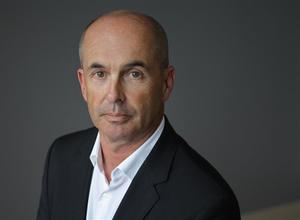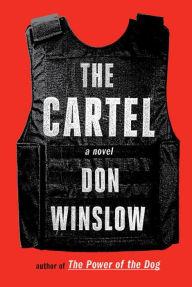
|
|
| photo: Michael Lionstar | |
Don Winslow has published more than 12 novels, including Savages (which was turned into a hit film directed by Oliver Stone), and its prequel, The Kings of Cool. His new book, The Cartel (see our review below), is a brutal look at the drug wars along the Mexican/U.S. border and a sequel to his epic The Power of the Dog.
As a crime writer, you've written mostly about Southern California's surf culture and its seedy underbelly. How much has your familiarity with Solana Beach and the general area affected your work?
Greatly. I think that location is inseparable from character and plot. The history of the place, the feel of the place, all inform how characters develop, what they do, what they think. Even a few miles can make a difference. The dress changes, the slang changes, if only a little bit. That fascinates me. I never get tired of driving around that area, walking, hanging out, hearing stories. I think just being at the coast also has informed my work. I got the idea of writing in the present tense from the ocean itself. In the water, the wave coming at you is vertical, it's in your face, it's happening in the moment and you can't see the next wave behind it. It has an immediacy and a suspense--same with writing in the present tense instead of the past--the story unfolds in front of you, as it's happening, like a wave. You put enough of those waves together, you have a book.
The Cartel is the sequel to your 2006 crime novel The Power of the Dog. Did you originally plan a sequel? Or did that idea come to you later?
I never intended to do a sequel to Dog. When I was done with that book--which took close to six years--I thought I was through with the topic of drug trafficking. At the time, I thought I had written about some of the worst things that human beings could do to each other. I was so wrong. As I watched developments in Mexico--the unbelievable escalation of the violence to levels that we could have seen only in our worst nightmares--I was reluctant, to say the least, to get back into it. I knew it would be another epic, and I knew what it would cost in terms of time and psychic energy. I really didn't know if I had it in me. I certainly resisted the idea. But I kept researching--reading books, articles, blogs, talking to people. I was starting the book without admitting to myself or anyone else that I was going to do it. I started to keep a day-by-day notation of events going on in Mexico. Those events kept getting more and more horrific, but I thought I could see patterns in what otherwise looked random. Then one morning I was writing. It's funny, the main character of The Cartel, Art Keller, starts off in a monastery, tending bees. I was living on an isolated old ranch, writing books, raising cattle and horses and doing Shakespeare with kids. We both ended up coming back.
 There are humanizing touches in Adan Barrera, the ruthless drug lord, and a villainous fury in Art Keller that make both men fully realized characters. How hard is it to achieve that in the context of the corrupting power of "the war on drugs?"
There are humanizing touches in Adan Barrera, the ruthless drug lord, and a villainous fury in Art Keller that make both men fully realized characters. How hard is it to achieve that in the context of the corrupting power of "the war on drugs?"
Of course, I have thoughts, and opinions, about characters. I stand back and make judgments about them--their place in the story, what they represent, their relative measure of good or evil. That's unavoidable, particularly given the circumstances of the Mexican drug wars. But when I actually write most of the scenes--there are rare exceptions--I have to forget all that. I have to write from inside their heads and their hearts. I have to try to see the world through their eyes. Very few people see themselves as "evil"--they see themselves as good people forced to do evil things. I think if you sat down with Adan Barrera, he would describe a step-by-step walk toward the horrors he commits or orders. I think he would tell you these things were necessary for the survival of himself and his family. He might not be wrong about that. Art Keller is more self-aware of the evil he commits in the name of doing the greater good. But he still believes it is the greater good.
Details move characters from stereotypes into real people. When we see them eat, take walks, shower, get dressed, whatever, we see people like ourselves, doing the "normal" things that we do. A lot of times, I try to introduce characters at the smallest moment possible. That lets the reader into the character's real life, and then you can expand from there.
While researching The Cartel, did you come across any events you considered using in the book but then discarded because they wouldn't be believed?
There was a story about a cartel that lined people up in a field and then ran over them with buses. I wasn't sure I believed it, but even if it were true, it came after another series of horrific events all happening in a single day and it just seemed like more than any reader could take in. The fact is that the cartels' activities can be so surreal as to be literally beyond comprehension. I would often get notes from the editor saying that this or that was "over the top" and I'd have the same response, "I agree, but that's what really happened." Then you get to the point where even if something is believed, it loses impact because of what else has already happened, so I had to try to look at these events through different points of view. In The Cartel, I often wouldn't write the event itself, but have someone come in afterward, and then write that character's reaction to the event, which, when you think about it, is closer to the reader's experience and therefore maybe more accessible. But I can't tell you how many times I had the reaction, "Well, that's just unbelievable," only to find out later that it was all too true.
In The Power of the Dog and The Cartel, you're tackling something bigger and more ambitious than in your previous novels.
I sure knew that they were ambitious projects, time- and soul-consuming, and that they had to be long books--epics, really--to tell the full story. In that sense, I knew I was playing "long ball," but I couldn't let myself think that way on a daily working basis. To mix sporting metaphors, maybe it's a little like a marathon; runners can't let themselves think of the entire distance, but concentrate on just putting one foot down after another. To me, these were the chapters--lay one down at a time, one after the other. The novel is organized into five separate books, and that's the way I tried to write it--make sure that each book was complete, told a story, and then moved on to the next one. When that was done, I went back and looked at the whole thing to make sure that it hung together and told a complete story, and that the five parts weren't disjointed. I think at that point, I really started to realize that I'd written a long and complex--ambitious--novel.
You had some unusual jobs and experiences before your writing career took off.
When you go to law school, you're a lawyer; medical school, you're a doctor. But nobody stamps your diploma "WRITER." I knew that's what I wanted to be, but I needed to make a living while the world came to the same conclusion. So I went to New York to be a writer and, of course, was a "starving writer" within weeks. I got a job as an assistant manager at a movie theater, which, oddly enough, evolved into becoming a PI when a friend asked me investigate theft in a chain of movie theaters that he managed in and around Times Square. That was before Disney, it was the wild, wild west then. When we went into the alleys, we'd press against the wall because guys were dropping cinder blocks from the roofs. Much later, I did investigative work at a much higher level in California--arson cases, murder, fraud, "bad faith" insurance cases--and was a consultant on trials. That's when I first got to know, and fell in love, with Southern California. In between, I did a stint as a guide for a friend's photographic safari company in Kenya--a great job, riding around finding elephants and leopards, living in tents, eating outdoors. The cook on one of my first safaris had been a cook on Hemingway's last safari, and used to tell me stories about "Papa" in Swahili. I think both jobs taught me some things about being a writer. Investigative work is a lot like researching a book--you look at a ton of documents, and you interview people to get answers--the same thing I did with The Cartel and most of my other books. Being a safari guide taught me to closely observe--to find certain animals, you had to look at certain kinds of trees, marks in the grass, know which way the wind was blowing (apologies to Mr. Dylan), anticipate what the animal was going to do next. That's a lot like crime writing.
Which writers made you want to become a writer? Which writers do you read today?
My mom was a librarian and my dad was a voracious reader, so we always had books in the house and were allowed to read anything we wanted at any age. As a child, I only wanted to read biographies and history. When I was 12 or 13, my dad turned me on to novelists like James Michener, Leon Uris and Robert Ruark, and I began to see the value of fiction, particularly when it was close to the bone factually and historically. Those guys really sparked my imagination. Then when I moved to New York, I started to read crime fiction and that was that--Raymond Chandler, Lawrence Block, Elmore Leonard, Charles Willeford, John D. McDonald, James Ellroy... the list goes on and on. I decided I wanted to do that. I fell in love with the genre, and it's still a romance. --Donald Powell, freelance writer

